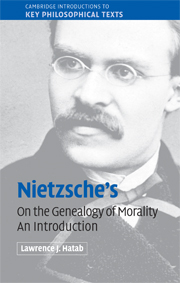Book contents
Introduction
Published online by Cambridge University Press: 05 June 2012
Summary
Friedrich Nietzsche's On the Genealogy of Morality is a forceful, perplexing, important book. It is widely recognized in philosophical treatments as a major text in Nietzsche's writings, and it has been the focus of much analysis in recent years. The Genealogy is taught and assigned in other disciplines as well, particularly in political philosophy and literary theory. One reason for the text's popularity, besides the power of its ideas, is that of all Nietzsche's writings after The Birth of Tragedy, it most resembles the form of a “treatise,” with extended discussions of organized themes and something of a historical orientation. As distinct from Nietzsche's typical aphoristic or literary styles, the Genealogy offers some advantages for classroom investigations. Yet one can hardly call this book a typical academic treatise. Nietzsche calls it a “polemic” and it is loaded with hyperbole, ambiguity, misdirection, allusion, provocation, iconoclasm, invective, prognostication, experiment, and Nietzsche's own vigorous persona.
Since Nietzsche has become a respectable figure in the academy (and he is one of the few post-Kantian continental philosophers taken seriously in Analytic circles), it is hard to appreciate the radical nature of the Genealogy in its nineteenth-century setting. Some readings tend to domesticate Nietzsche by pressing the text into the standard logistics of professional philosophers and contemporary theoretical agendas. Other readings miss the intellectual power of the book by overplaying its radical character in the direction of unhinged celebrations of difference and creativity (which actually perpetuates another kind of domestication).
- Type
- Chapter
- Information
- Nietzsche's 'On the Genealogy of Morality'An Introduction, pp. 1 - 7Publisher: Cambridge University PressPrint publication year: 2008

